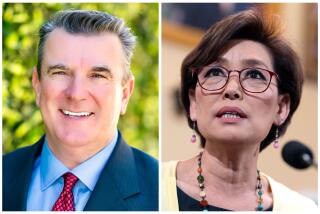Kim Dae Jung Assails Military Role : Says He Wants to Run to Prevent Veto Over Korea Election
SONGNAM, South Korea — Kim Dae Jung declared Sunday that he wants to run for president to deny “politically motivated military leaders” a veto power over whom the South Korean people can elect as their leader.
Aides called Kim’s statement, made to a crowd of about 120,000 people at a rally in this bedroom suburb of Seoul, a de facto proclamation of his candidacy, which he is expected to announce formally later this week.
With Kim in the race, the opposition will be divided in the presidential election scheduled to be held by Dec. 20. Kim Young Sam, 59, Kim Dae Jung’s chief rival in the opposition, officially proclaimed his candidacy Saturday. Both Kims are members of the principal opposition body, the Reunification Democratic Party.
Admits Military Opposition
With his Sunday speech, Kim Dae Jung, 63, squarely confronted the facts that there is widespread opposition to him among South Korea’s armed forces and that his election to the presidency could provoke another coup in this country.
“I find it difficult to abandon running because of the logic of a ‘veto group’ being discussed by some people in our party--namely, that I cannot be a candidate because the military dislikes me,” said the man who was the opposition candidate the last time direct presidential elections were held here in 1971.
Declaring that one of the purposes of achieving democracy through an opposition victory is “to end the military dictatorship,” Kim said that selection of an opposition candidate based upon “whether a segment of politically motivated military leaders supports the candidate . . . (would) mean we have given up democratization.”
Such a choice, he added, would “make meaningless the sacrifices of (people killed in a) Kwangju (rebellion against President Chun Doo Hwan’s coup of May, 1980) and tens of thousands of others who have struggled for democracy.”
‘Immediate Victim’
Kim described himself as “the immediate victim” of the 1980 Kwangju rebellion and its repression and said that, as such, he is “one of the most qualified persons to resolve the problem in a manner convincing to our people as well as to the victims and in a way to bring about national reconciliation . . . without reprisals.”
Arrested on the night of May 17, 1980, when Chun staged the coup, Kim was later charged with fomenting the Kwangju rebellion. Brutality by troops sent by Chun to put down demonstrations, which began the day after Kim’s arrest, turned the affair into an insurrection in which 194 people died by official count. The opposition insists that the toll was much higher.
Kim later was convicted and condemned to death, a sentence that subsequently was commuted to 20 years in jail. His civil rights were restored by Chun only last July.
Kim said that another factor encouraging him to run for president is a desire to bring about peaceful coexistence and peaceful exchanges with Communist North Korea “within the next five years.”
Not to run for president, he added, “would be an unprecedented breach of trust to those who have been supporting me.”
Kim said nothing in his speech about the split in the opposition vote that will result from the candidacy of the rival Kims, a development sure to improve the chances of the ruling party’s presidential candidate, Roh Tae Woo, 55, a former army general handpicked by President Chun to head the Democratic Justice Party slate.
Sunday’s rally was the sixth in which Kim Dae Jung has attracted crowds in the tens of thousands to outdoor affairs.
‘Pan-National’ Interim Cabinet
In his speech, Kim called once again for a “pan-national” interim Cabinet, made up of members of the ruling and opposition parties as well as dissidents, to oversee the December election. He asserted that a “neutral” government is needed to end vote-buying and “other corrupt campaign practices,” which he charged the government has already started.
“We warn the current regime that if it dares to carry out unfair elections, it will face a grave judgment by the people,” Kim said.
He also spoke in favor of an eight-hour workday, replacing the country’s present 11-hour-a-day standard. And he called for a minimum wage system and for abolition of the nation’s system of farm tenancy.
More to Read
Sign up for Essential California
The most important California stories and recommendations in your inbox every morning.
You may occasionally receive promotional content from the Los Angeles Times.










